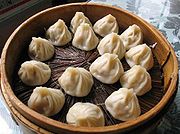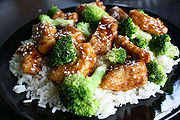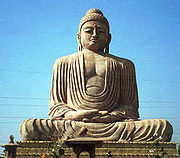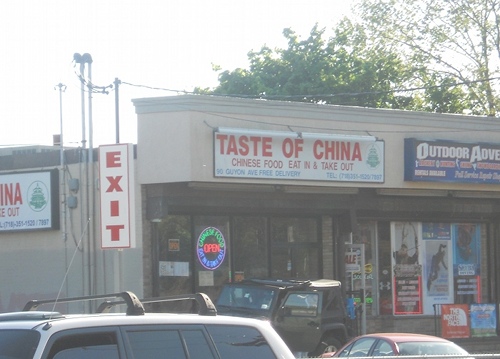From The Peopling of New York City
Contents |
Philip Ma
Philip Ma is currently finishing his freshman year at the Macaulay Honors College at the College of Staten Island. He is a Chinese-American, and was born in Port Richmond on Staten Island. His parents are Chinese as well, and they are the ones in the family who push for the importance of tradition and culture. He speaks the Chinese dialect of Cantonese while his parents speak both Cantonese and Mandarin dialects.
Philip feels that he is part of his Chinese culture as well as the American culture. He states that his family goes to Chinatown in Manhattan and Asian-situated areas in Brooklyn where he has family members. His relatives live in the Chinese culture-rich areas of Manhattan and Brooklyn; therefore he is always participating in his heritage, especially with New Years celebrations and other traditional Chinese holidays. Philip also says that he is keeping his cultural identity by being around his family who still identify themselves with the Chinese culture, celebrating certain holidays, attending cultural events in Chinatown, and volunteering to help in Brooklyn when Chinese festivities occur.
Traditions make up a big part of Philip’s cultural identity. His family always eats meals together, which is an important tradition in many cultures around the world. Also, every year when they celebrate Chinese New Year, the mid-autumn festival, his entire family gathers in either Brooklyn or Staten Island to have dinner and engage in leisurely games such as playing video games or mahjong, which is a four-player card game. Another tradition of Philip’s family is that every year they go to a cemetery where deceased members of his family are buried and they celebrate their afterlives. Traditions clearly make up a big part of Philip’s cultural identity and they make up who he is as a person.

Philip’s ethnic background has affected his daily life. In junior high school, he felt that the environment did not really accept his culture. He said, “It was heavily populated by African Americans and Hispanic people, so I wouldn’t say it was hostile but it wasn’t as accepting until I entered high school and college. It is during these years where I’m pretty comfortable with my ethnic background and what I stand for so I don’t have to adapt at all that much.” In contrast, religious beliefs and activities have not affected Philip’s daily life. Although his parents are both Catholic, Philip and his brother were never baptized and they do not have a solid religion. They are not very religious people, but they are not atheistic either. Rather, Philip states that “they just have different definitions for what God and every other belief is, which is what may clash with what others believe.” Overall, Philip is open to many other religions and the lessons that each one teaches, but religion as a whole does not affect him that much.
Food plays a large role in Chinese culture and tradition. Philip’s favorite dish, Shanghai dumplings, is a popular dish made both in America and in China. According to Philip, the dumplings are made with a thin steamed bun that is most commonly filled with pork and minced crab along with a certain soup inside. In addition, Philip talked about the differences between American Chinese food and Chinese food from China and Chinese households. He said, “In American Chinese food, there is a lot of MSG used to flavor everything and the dishes served here is more catered towards Americans…Home food is prepared differently and it is not heavily seasoned. It takes much longer to prepare the dishes.” Philip tells us that authentic Chinese food is a lot less flavored but it is much more healthier and fresher. Restaurants in Chinatown in Manhattan happen to be where the most authentic Chinese food is made and sold.
Philip Ma is a prime example of a Chinese-American who has assimilated into the American culture, but is still strongly connected with his Chinese culture as well. Through the languages, traditions, cultural activities, and food, Chinese culture plays a large role in his life. It has influenced him in his thoughts, actions, and beliefs and it makes up the person that he is today.
Annie Chen
Annie Chen is currently the manager of the Chinese restaurant, The Taste of China. Her restaurant is located at 90 Guyon Ave, right behind Monsignor Farrell High School. The Taste of China is a take-out restaurant that mostly attracts high school students and working families in the neighborhood. Annie is a Chinese-American who was born in China and just recently moved from Manhattan. Her parents had moved to Manhattan first while Annie was still living in China, and she followed suit soon after. Although her parents just recently retired back to China about six months to a year ago, Annie decided to move to Staten Island to open up a business.
Annie Chen does not believe that she has a strong part of her culture. She does not partake in most Chinese traditions and she feels that she has partly assimilated into American culture. Although her restaurant emphasizes Chinese culture with the use of Chinese writing and décor on the walls, utensils (chop sticks), and take-out menus with Chinese translations, Annie believes that she herself is not a big part of her culture.
With her restaurant located on a busy street surrounded by different stores and a high school, one can see why Annie opened her restaurant in this area. With her specialty in business and management, Annie decided to open a restaurant because that is what she grew up doing. She used to work for another restaurant when she was younger, and this is the only business that she knows how to do and be successful at it. In addition, the workers of The Taste of China are all relatives of Annie, with the exception of the hostess. The location of her restaurant is essential to her business. The Taste of China attracts many high school students and people coming home from work in Manhattan or elsewhere. She states that her business is successful because of the hungry students getting our of school and “working Americans coming home at night after their day do not have time to prepare a meal for themselves and their family.” Annie also praises her customers because each of them are very friendly and satisfied with the restaurant’s food.

The Taste of China provides a variety of choices on its menu, and it can be said that food plays an important role in both American and Chinese cultures. Of all the dishes on the menu, chicken with broccoli and sesame chicken are the most popular. In addition, Annie described the differences between Chinese food in America and food in China. American Chinese food is all frozen prior to being cooked and sold. She states that the Chinese food cooked in America is more heavily flavored. However, food in China is never frozen and is always fresh. It is very healthy and it tastes much different from what Americans consider Chinese food. Annie goes on to say that the food industry in very successful as a whole and it is the best industry to get into in New York City. She also says that China is extremely different from America and what Americans perceive China to be: “Many students go to China a lot during or after college and they are amazed at how different China is from America.”
Annie Chen is a successful business owner and her culture is expressed through her business. Although she believes that she is not a big part of her culture, her restaurant proves to be a true Chinese American ethnic institution through its style, décor, and menu.
Justine Kwok
Justine Kwok is currently finishing her freshman year at Stony Brook University in Long Island, NY. She is a Chinese-American originally from Brooklyn, NY. She moved to Staten Island when she was around three years old. Justine feels that she still is influenced by her Chinese culture, and as she grew older her American culture affected her life as well.

Justine believes that she is a part of both the Chinese and American cultures. She said, “There are definitely parts of both, and it’s like being part of two different worlds. I find it almost impossible to act Chinese around Americans, and act American around Chinese.” She speaks the Chinese language to her family and she takes part in the traditions as much as possible. Although Chinese culture has heavily influenced her life, she partakes in more American traditions and festivities. She said, “I’m afraid that I’m so American that some of the traditions that my family practices now are going to be lost within our generation.”
Justine’s family participates in different Chinese traditions. She explained that she is part of the Buddhist and Daoist religions. As a part of her religion, during the lunar calendar holidays her family sets up altars, light incense everyday, and they prepare certain food to give to the spirits. Another tradition in her family is that she keeps a bible under her bed to keep out bad dreams. She feels that although she partakes in these traditions, her religious beliefs do not really play a huge role in her life. Justine’s ethnic background affects her daily life, even though her religious beliefs do not.
According to Justine, food plays a big role in her and her family’s lives. Her favorite Chinese dish is a big bowl of jumbo shrimp mixed with broccoli, nuts, and sauce. She also stated that American Chinese food is completely different from the food in China: “American Chinese food is definitely more oilier and they put a lot more meat, whereas traditionally we use more vegetables and rice than meat.” Authentic Chinese food is much more healthier and restaurants in China are very different from the Chinese restaurants in America. Fortune cookies and appetizers, such as fried noodles, are nonexistent in traditional Chinese restaurants. America has transformed the cooking of China by appealing to its consumers and making it more oily and filling.
Justine Kwok is a Chinese-American individual who has been influenced by both cultures. Although she does not feel like her religion has heavily influenced her daily life, the customs and traditions have made her the person she is today. Now that she is away at school, Justine notices how much her Chinese culture affects her life in comparison to other Americans by what she says and the way she does certain things, such as speaking, eating, and clothing.

